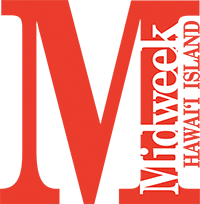A Long Time Coming
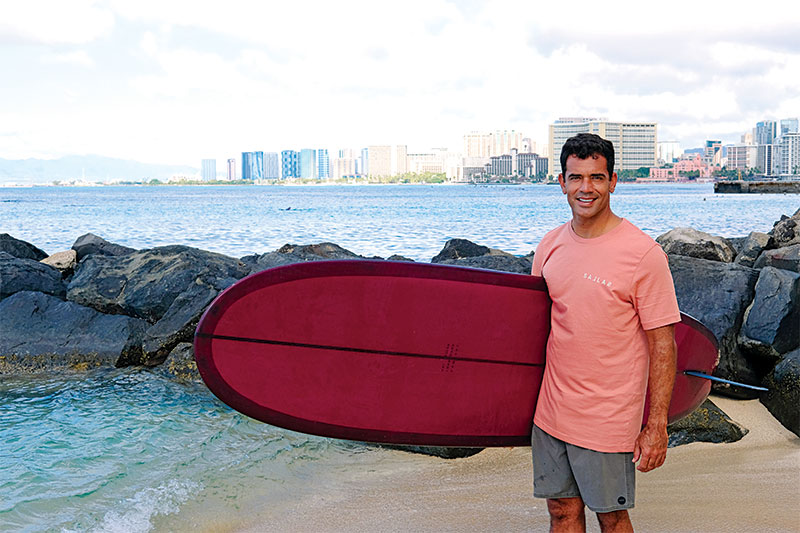
PHOTO BY Lawrence Tabudlo
Good things come to those who wait, as Kai Sallas, this year’s World Surf League Longboard champion, discovered.
The fog in Malibu was so intense that the World Surf League had to postpone its Long-board World Championships until visibility improved. For Kai Sallas, a 42-year-old Waikīkī native, the uncertainty of competitive surfing was nothing new — he’d been at it for three decades.
Finally, on Oct. 9, the contest got the greenlight, drawing in longboarders from various corners of the globe — the United States, United Kingdom, Australia, France and the Philippines — who swiftly made their way into California’s chilly waters. As the day progressed, the line up dwindled until only two remained: Sallas and fellow Waikīkī boy Kaniela Stewart, 21. In a best-of-three showdown, the atmosphere intensified, and by round three, the Queen’s Beach regulars with 20 years between them were neck and neck. It was anyone’s crown.
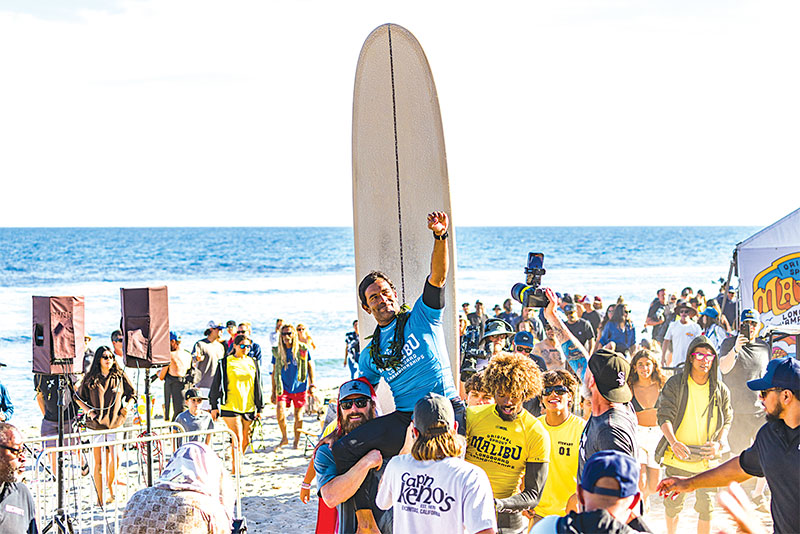
Kai Sallas celebrates his ~ rst world title as fellow longboarding contestants carry him ashore. PHOTO COURTESY WORLD SURF LEAGUE/KENNY MORRIS
With just 10 seconds left on the clock and Sallas holding a slight lead of 1.19 points, a wave of relief washed over him, as he shook his head in disbelief. Standing atop his board, he leaped into the ocean in exaltation. Even through the haze, his smile could be seen from space, as the reality of his first world title sank in.
“It was a dream come true moment,” says Sallas. “My family, my wife and kids, and a lot of people from Hawai‘i were on the beach and I could look in and see everyone. It was the best surfing moment of my life to finally win after all those years.
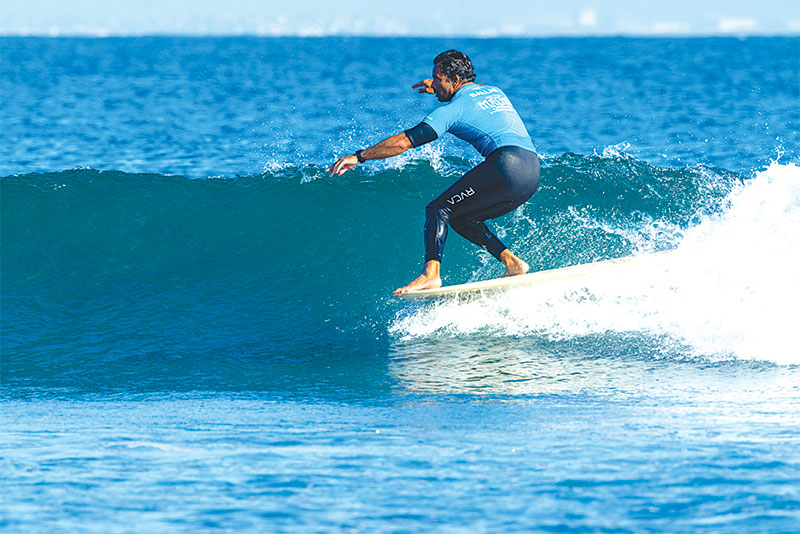
World champion Kai Sallas, 42, has been competing since he was 12 years old. PHOTO COURTESY WORLD SURF LEAGUE/TOMMY PIERUCKI
“There were many years where I was getting older and I was like, ‘Dang, this is probably never going to happen,’ but I thought I would put my head down and give it another crack and to finally get it was super special.”
Sallas began surfing at age 10 and signed up for his first competition two years later. Living just a block from one of the world’s renowned longboarding beaches meant endless surf sessions from sunrise to sunset.
Once he made a name for himself locally, Sallas moved on to the big leagues. His breakthrough came in 2009 when he placed second in a contest in the Maldives and walked away with $10,000.
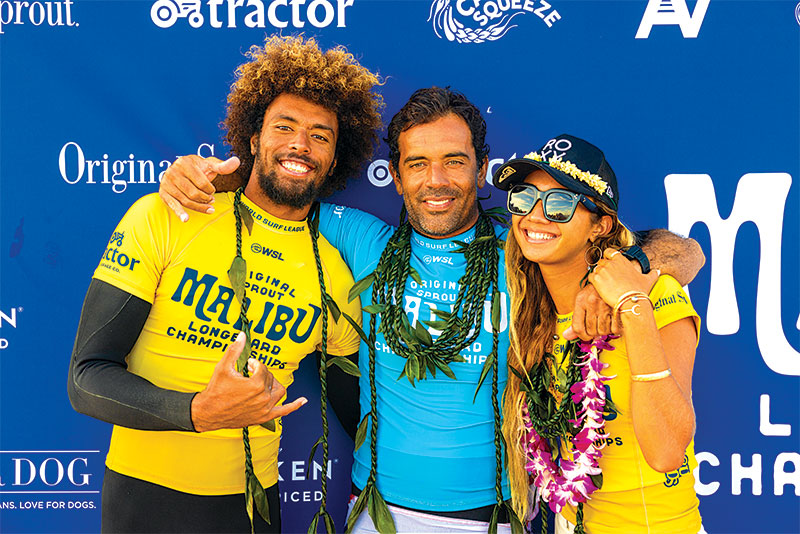
(From left) Kaniela Stewart, Kai Sallas and Kelis Kaleopa‘a are all smiles following the WSL Longboard World Championship.
“My parents never had money; I didn’t have money growing up … It was the most money I ever had in my life,” says the Kalani High School grad.“It was right after my first daughter was born, so I took all that money and used it to start my surf school.”
With a van, a few surfboards, an ad in a pamphlet and a dream, Sallas established Pro Surf School Hawai‘i. He taught beginners how to paddle, balance and time the perfect wave right down the street from where he learned those skills himself.
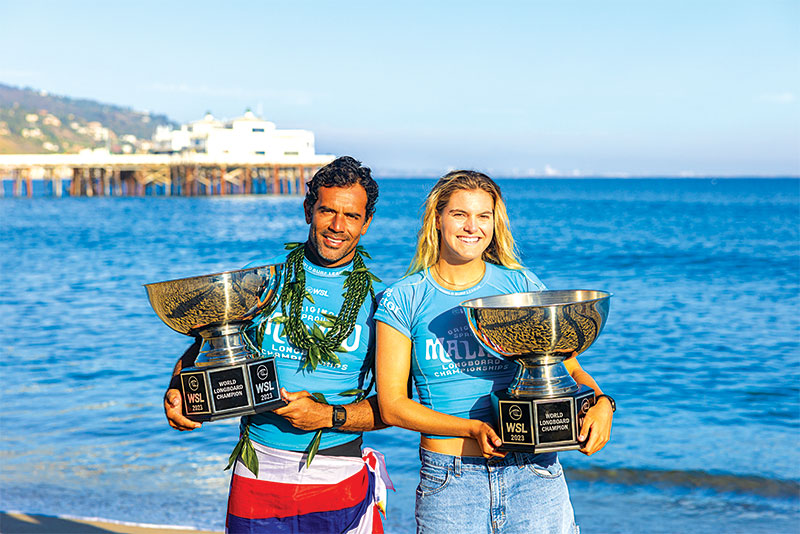
Sallas with fellow longboard champ Soleil Errico, who snagged the title in the women’s division. PHOTOS COURTESY WORLD SURF LEAGUE/ TOMMY PIERUCKI
“Growing up in Waikīkī, that was the way to make money — you taught surfing. That’s what my dad did, and all of my uncles did,” says Sallas. “When I had my first child, it was like, ‘OK.’ All I wanted to do was surf. I didn’t care about money too much, but it was time to support a kid.”
All was well until COVID-19 lock-downs brought surf lessons to a stop. Sallas, like many others, found himself with a ton of free time, and seized the opportunity to pursue a long-time dream: crafting his own surfboards.
“We had to wear masks and be isolated so it was perfect to be in this shaping room all by myself every day with my mask on. I would just shape boards,” says Sallas, adding that he unofficially shadowed the late board shaper, Donald Takayama, in a wax on, wax off, Mr. Miyagi kind of way.
“We could still surf during COVID so I was shaping boards and testing them out. In that time, I shaped hundreds of boards.”
Entering this year’s world tour, Sallas felt an unprecedented level of confidence. He rode boards shaped by his own two hands (fun fact: so did his competitor/friend, Stewart) and felt like he was in his prime physically.
“I’m more experienced and mentally prepared,” says Sallas. “I found a few ways to cope with the mental side of competing and read a few sports psychology books. I’m just smarter now in so many ways in how to train and prepare for contests.
“I make my own boards, so I know how to make the correct equipment for the right waves for where we’re traveling to. Now that I’m older it all came together.”
Sallas — who seems to live by the saying, “fall down nine times, get up 10” — is not one to shy away from hard work. Returning to the WSL tour year after year requires an impressive amount of grit, a trait he’s proud of.
“You just have to be able to accept your losses,” he says. “I feel like people get super devastated for their losses. I think early on when I would lose, I would just try to tell myself to learn from it; learn why you lost, apply that to the next event and keep looking forward to the next event.
“In surfing, no matter who you are, statistically, you’re going to lose more than you win. Even Kelly Slater lost more than he won, you know? It’s just natural and … I try to only control the things I can control. I feel more down on myself when I wouldn’t prepare properly for a contest, so if I lose, at least I know I put maximum effort into it.
“I hope to inspire all the younger kids to show them that if you don’t give up and keep trying, it can happen for you. A lot of the kids, if they lose are all devastated, but I just want them to know they’re still young and there’s plenty time. You can keep doing it for a long time. I’m proud of that.”
Now with a world championship under his belt, will the surfing veteran ride off into the sunset?
“Even before I competed in Malibu I was thinking if I should retire, and I thought that would be a pretty cool way to end it even after winning. I finally figured out so much things and I feel like I’m surfing the best that I’ve ever surfed — so, yeah, I’m going to keep going. I think this year (2024) I can compete with a huge weight off my shoulders. I’m just going to travel with my family and have fun and experience this opportunity that I have for a few more years while I’m still young enough to do it. I don’t want to regret it when I’m older.”
